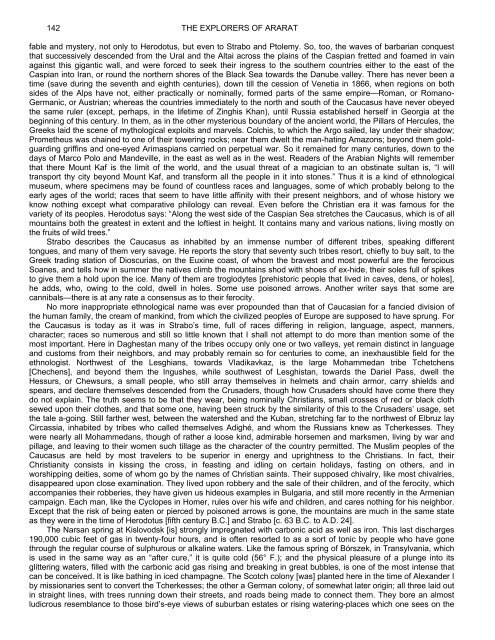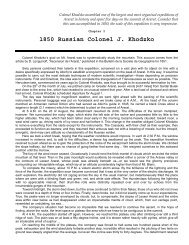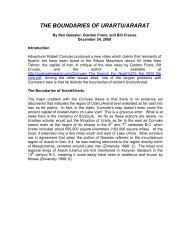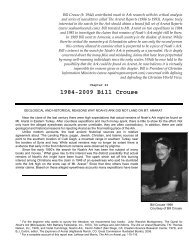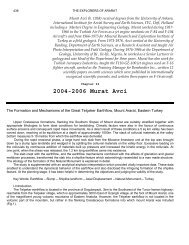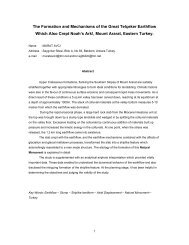1876 British Viscount & Ambassador James Bryce - Noah's Ark Search
1876 British Viscount & Ambassador James Bryce - Noah's Ark Search
1876 British Viscount & Ambassador James Bryce - Noah's Ark Search
You also want an ePaper? Increase the reach of your titles
YUMPU automatically turns print PDFs into web optimized ePapers that Google loves.
142 THE EXPLORERS OF ARARAT<br />
fable and mystery, not only to Herodotus, but even to Strabo and Ptolemy. So, too, the waves of barbarian conquest<br />
that successively descended from the Ural and the Altai across the plains of the Caspian fretted and foamed in vain<br />
against this gigantic wall, and were forced to seek their ingress to the southern countries either to the east of the<br />
Caspian into Iran, or round the northern shores of the Black Sea towards the Danube valley. There has never been a<br />
time (save during the seventh and eighth centuries), down till the cession of Venetia in 1866, when regions on both<br />
sides of the Alps have not, either practically or nominally, formed parts of the same empire—Roman, or Romano-<br />
Germanic, or Austrian; whereas the countries immediately to the north and south of the Caucasus have never obeyed<br />
the same ruler (except, perhaps, in the lifetime of Zinghis Khan), until Russia established herself in Georgia at the<br />
beginning of this century. In them, as in the other mysterious boundary of the ancient world, the Pillars of Hercules, the<br />
Greeks laid the scene of mythological exploits and marvels. Colchis, to which the Argo sailed, lay under their shadow;<br />
Prometheus was chained to one of their towering rocks; near them dwelt the man-hating Amazons; beyond them goldguarding<br />
griffins and one-eyed Arimaspians carried on perpetual war. So it remained for many centuries, down to the<br />
days of Marco Polo and Mandeville, in the east as well as in the west. Readers of the Arabian Nights will remember<br />
that there Mount Kaf is the limit of the world, and the usual threat of a magician to an obstinate sultan is, “I will<br />
transport thy city beyond Mount Kaf, and transform all the people in it into stones.” Thus it is a kind of ethnological<br />
museum, where specimens may be found of countless races and languages, some of which probably belong to the<br />
early ages of the world; races that seem to have little affinity with their present neighbors, and of whose history we<br />
know nothing except what comparative philology can reveal. Even before the Christian era it was famous for the<br />
variety of its peoples. Herodotus says: “Along the west side of the Caspian Sea stretches the Caucasus, which is of all<br />
mountains both the greatest in extent and the loftiest in height. It contains many and various nations, living mostly on<br />
the fruits of wild trees.”<br />
Strabo describes the Caucasus as inhabited by an immense number of different tribes, speaking different<br />
tongues, and many of them very savage. He reports the story that seventy such tribes resort, chiefly to buy salt, to the<br />
Greek trading station of Dioscurias, on the Euxine coast, of whom the bravest and most powerful are the ferocious<br />
Soanes, and tells how in summer the natives climb the mountains shod with shoes of ex-hide, their soles full of spikes<br />
to give them a hold upon the ice. Many of them are troglodytes [prehistoric people that lived in caves, dens, or holes],<br />
he adds, who, owing to the cold, dwell in holes. Some use poisoned arrows. Another writer says that some are<br />
cannibals—there is at any rate a consensus as to their ferocity.<br />
No more inappropriate ethnological name was ever propounded than that of Caucasian for a fancied division of<br />
the human family, the cream of mankind, from which the civilized peoples of Europe are supposed to have sprung. For<br />
the Caucasus is today as it was in Strabo’s time, full of races differing in religion, language, aspect, manners,<br />
character; races so numerous and still so little known that I shall not attempt to do more than mention some of the<br />
most important. Here in Daghestan many of the tribes occupy only one or two valleys, yet remain distinct in language<br />
and customs from their neighbors, and may probably remain so for centuries to come, an inexhaustible field for the<br />
ethnologist. Northwest of the Lesghians, towards Vladikavkaz, is the large Mohammedan tribe Tchetchens<br />
[Chechens], and beyond them the Ingushes, while southwest of Lesghistan, towards the Dariel Pass, dwell the<br />
Hessurs, or Chewsurs, a small people, who still array themselves in helmets and chain armor, carry shields and<br />
spears, and declare themselves descended from the Crusaders, though how Crusaders should have come there they<br />
do not explain. The truth seems to be that they wear, being nominally Christians, small crosses of red or black cloth<br />
sewed upon their clothes, and that some one, having been struck by the similarity of this to the Crusaders’ usage, set<br />
the tale a-going. Still farther west, between the watershed and the Kuban, stretching far to the northwest of Elbruz lay<br />
Circassia, inhabited by tribes who called themselves Adighé, and whom the Russians knew as Tcherkesses. They<br />
were nearly all Mohammedans, though of rather a loose kind, admirable horsemen and marksmen, living by war and<br />
pillage, and leaving to their women such tillage as the character of the country permitted. The Muslim peoples of the<br />
Caucasus are held by most travelers to be superior in energy and uprightness to the Christians. In fact, their<br />
Christianity consists in kissing the cross, in feasting and idling on certain holidays, fasting on others, and in<br />
worshipping deities, some of whom go by the names of Christian saints. Their supposed chivalry, like most chivalries,<br />
disappeared upon close examination. They lived upon robbery and the sale of their children, and of the ferocity, which<br />
accompanies their robberies, they have given us hideous examples in Bulgaria, and still more recently in the Armenian<br />
campaign. Each man, like the Cyclopes in Homer, rules over his wife and children, and cares nothing for his neighbor.<br />
Except that the risk of being eaten or pierced by poisoned arrows is gone, the mountains are much in the same state<br />
as they were in the time of Herodotus [fifth century B.C.] and Strabo [c. 63 B.C. to A.D. 24].<br />
The Narsan spring at Kislovodsk [is] strongly impregnated with carbonic acid as well as iron. This last discharges<br />
190,000 cubic feet of gas in twenty-four hours, and is often resorted to as a sort of tonic by people who have gone<br />
through the regular course of sulphurous or alkaline waters. Like the famous spring of Bórszek, in Transylvania, which<br />
is used in the same way as an “after cure,” it is quite cold (56° F.); and the physical pleasure of a plunge into its<br />
glittering waters, filled with the carbonic acid gas rising and breaking in great bubbles, is one of the most intense that<br />
can be conceived. It is like bathing in iced champagne. The Scotch colony [was] planted here in the time of Alexander I<br />
by missionaries sent to convert the Tcherkesses; the other a German colony, of somewhat later origin; all three laid out<br />
in straight lines, with trees running down their streets, and roads being made to connect them. They bore an almost<br />
ludicrous resemblance to those bird’s-eye views of suburban estates or rising watering-places which one sees on the


